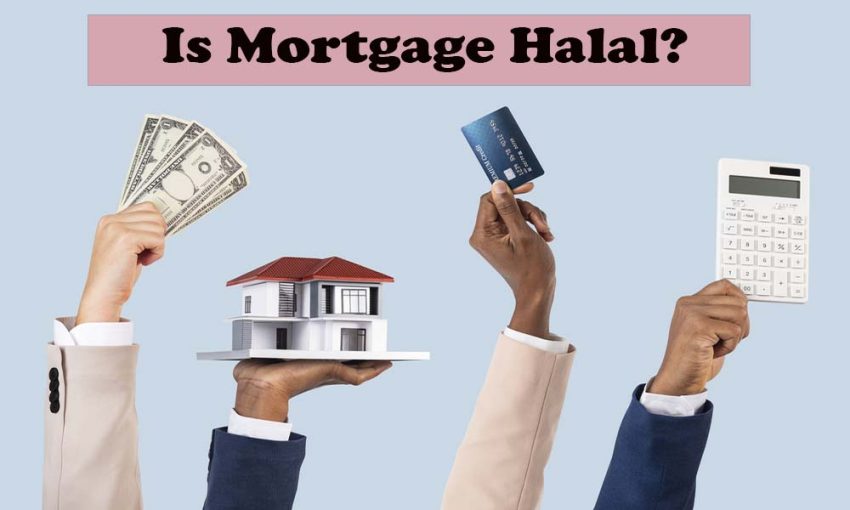For many Muslims, adhering to religious principles is paramount, even financially, like purchasing a home. The question of whether a mortgage is Halal (permissible) or Haram (forbidden) often arises.
This blog post explores the Islamic perspective on mortgages. We will also discuss other options within Islamic finance, including Murabaha, Ijara, and Musharaka.
By understanding these concepts, readers can make informed decisions about home financing that align with their religious beliefs. Let’s delve into this critical discussion on Halal mortgages.
Can Muslims Get a Mortgage?
Yes, Muslims can obtain a mortgage, but it isn’t as straightforward. Conventional mortgages involve the lending and borrowing money with interest, which contradicts the Islamic principle of “Riba” (interest). Riba is prohibited in Islam because it is seen as exploitative.
However, there are halal alternatives to conventional mortgages that comply with Islamic law (Sharia). These alternatives avoid the charging of interest and instead incorporate a variety of unique concepts like Ijara (leasing), Musharaka (partnership), and Murabaha (profit markup).
For a better understanding, watch the video.
Is Mortgage Halal?
Muslims worldwide often debate the permissibility of a mortgage when purchasing real estate property, as it is considered one of life’s most significant financial decisions. There are differing opinions among Islamic scholars regarding the use of mortgages.
Let’s dive deeper into the subject and consider some crucial factors that affect one’s decision.
The Differing Opinions Of Islamic Scholars On The Matter
Many scholars argue that taking out a mortgage goes against the principles of Islam, as interest is considered haram (forbidden) in Islam. However, others contend that if the mortgage follows specific guidelines and does not include any interest, it can be considered halal.
Those guidelines include the following:
- The property being purchased must not be haram (forbidden) in Islam
- The mortgage should not include any riba (interest)
- The mortgage agreement must not contain any ambiguous clauses or conditions
- The mortgage must adhere to all the rules and regulations of local law
The Various Factors To Consider Before Deciding Whether A Mortgage Is Halal For An Individual
Before deciding whether a mortgage is halal or haram, it’s essential to consider some of the following factors:
- The individual’s financial circumstances and ability to afford the mortgage’s repayments
- The individual’s reasons for taking out the mortgage
- The potential risks and benefits of taking out a mortgage
- The available alternatives to taking out a mortgage, such as paying rent or purchasing a property outright with cash
- The real estate market situation in the area where the property will be purchased
Whether mortgages are halal in Islam is much debated and discussed. Still, it’s essential to consider all the factors before making a final decision. It’s also crucial to consult with an Islamic finance expert or an imam to better understand the different perspectives.
What Are The Benefits And Drawbacks Of A Halal Mortgage?
A halal mortgage has several benefits for Muslims who want to buy a home without compromising their faith. Some of these benefits are:
- It allows you to avoid interest, which is haram in Islam.
- It allows you to share the risk and reward of owning a property with your partner (the bank or the lender).
- It allows you to benefit from capital appreciation if your property increases in value over time.
- It allows you to have more flexibility in choosing your repayment plan and your property type.
However, a halal mortgage also has some drawbacks you should know before applying for one. Some of these drawbacks are:
- It may be more expensive than a conventional mortgage regarding fees.
- Finding a suitable lender who offers halal mortgages in your area may be more challenging.
- It may be subject to changes in rental rates or market prices that could affect your monthly payments.
- It may have less protection from regulatory bodies or consumer rights groups than a conventional mortgage.
Types of Halal Mortgage

As mentioned above, there are several types of halal mortgages. Here’s a bit more detail about each one:
Ijara (Leasing)
Under the Ijara model, the bank purchases and leases property to the customer. The customer’s monthly payment includes a portion for rent and a portion for purchasing the property from the bank. Over time, the customer’s equity in the property increases until they eventually own it outright. This is similar to the idea of rent-to-own.
Musharaka (Partnership)
The Musharaka model is a form of declining partnership. Both the bank and the customer purchase the property together, and the customer gradually buys the bank’s share over time. The monthly payment includes rent for using the bank’s share of the property, and a portion goes towards buying out the bank’s share.
Murabaha (Cost Plus Financing)
In the Murabaha model, the bank buys and sells the property to the customer at a profit. The sale price and profit margin are agreed upon at the time of the contract. The customer then makes fixed payments over a set period.
Frequently Asked Questions For Is Mortgage Halal
Under Islamic law, conventional mortgages that charge interest are inherently haram (forbidden). Muslims must use alternative financing models, such as ijara or musharaka.
Ijara is a Sharia-compliant financing arrangement in which a bank or lender purchases a property for a borrower, who then agrees to rent the property until the loan is paid back. This arrangement allows Muslims to purchase homes without paying interest.
The main difference between a halal mortgage and a conventional mortgage is how interest is handled. Conventional mortgages charge interest, which is forbidden in Islamic law, while halal mortgages use sharia-compliant alternative financing models, such as ijara or musharaka.
Conclusion
As we’ve seen, the question of whether mortgages are halal is complex, with differing opinions depending on the interpretation of Islamic law. While some argue that mortgages are not halal because they involve paying interest, others point out that there are ways to structure home financing in a Sharia-compliant way.
Ultimately, individuals must make their own decisions based on their beliefs and circumstances. However, it’s essential to do so with a thorough understanding of the various perspectives on this issue.
By seeking expert advice and staying informed about developments in halal finance, we can ensure that we make ethical and financially prudent choices about home ownership.
You may like:

